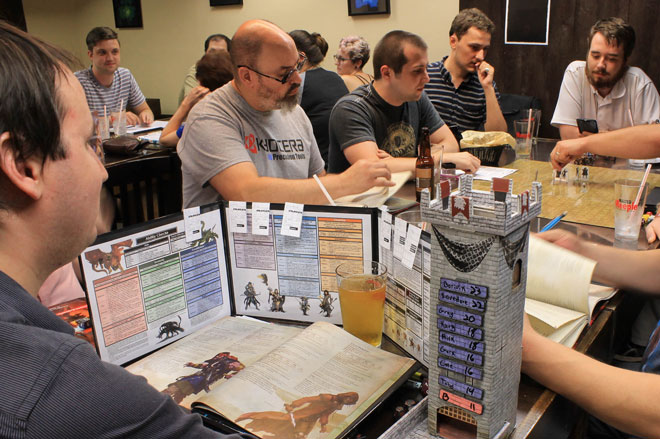In the GM’s Journal we will discuss all things role playing. From tips for running a successful table to reviews of various systems, you’ll find it here.
Party Roles Part 1: Combat
In most roleplaying games, players must work together as a team in order to overcome obstacles. Just like in the real world, each character has certain strengths and weaknesses; thus, each character has a different role to play in the party during combat. Because combat is such a big part of most roleplaying games, this article will be focusing on those combat roles. In a future blog post, I will discuss party roles outside of combat.
Most players have their preferred playstyle and most characters tend to fit into one of the following three categories:
The Tank
This character wades fearlessly into battle with little regard for his own wellbeing. He purposefully puts himself between his party and the enemy. Tanks usually wear a lot of armor, and have a lot of health. This allows them to take multiple heavy hits without wavering. In addition to taking hits, many tanks can “dish it out” so to speak. However, the tradeoff for more damage is usually less survivability. The role of the tank is to draw the attention of the enemy and keep their focus centered on you. This allows the rest of the party to perform their duties unimpeded. This character is the anvil that the enemy pounds away at. If you enjoy being the center of attention, fighting up close and personal, wearing big heavy armor, and being tough, play the tank.
The Glass Cannon
If the tank is represented by the anvil, the glass cannon is the hammer. This character is able to crank out tons of damage while expending relatively few resources. As the name suggests, glass cannons are usually not able to sustain much damage and must depend on other characters such as the tank and the support to draw the enemy’s focus away from them. Unimpeded, a glass cannon’s role is simple: neutralize enemies as quickly as possible before they can do significant damage to your party, all while conserving the party’s resources. Some glass cannons are able to rain death on several enemies at a time, while others focus on neutralizing a single target quickly. The tradeoff of course is that affecting more than one target has drawbacks: lower damage output, friendly fire, or other negative effects. Some glass cannons strike from a distance while others wade in to melee combat right next to the tank. If you like eliminating dangerous foes, dealing as much damage as possible, and being dangerous, play the glass cannon.
The Support
It comes as no surprise that a support character supports the party. This character is responsible for any combination of the following roles: mitigating party damage, strengthening the party, weakening the enemy, gaining and maintaining tactical advantages, and tending to the party’s wounds. As you can see, this character tends to wear many hats. However, most of the time, support characters are only able to focus on a few of these roles. Ultimately, the support character is responsible for keeping the party in the fight, all while making the fight easier for the rest of the party. Most support characters contribute little in the way of damage and lack the durability of other characters. It is important to note that the more specialized a support character is, the less flexible they become. Likewise, a character who is too generalized finds themselves to be a jack of all trades and a master of none. It all comes down to personal preference. If you enjoy helping your fellow players, making tactical decisions, being a living Swiss army knife, play support.
The End
In order to maintain a good party balance, it is always good to have an even mix of the three combat roles. For a group of six, I recommend having two of each type for a well-balanced party. However, some roleplaying games offer roles that are not combat effective, but essential to the experience. Next time we will discuss the roles outside of combat and why they are important.
Do you have a favorite role to play? Tell us what it is and why?! Join the conversation on Facebook.
Until next time: See you at the Table!
Karington Hess is a lifelong gamer whose passions for hospitality and all things game-related led him to Ravenwood Castle, where he served as an Innkeeper before joining The Malted Meeple. When not pouring beers, crafting milkshakes, or teaching boardgames, Karington can be found behind the DM’s screen, weaving intricate stories for his fellow gamers.

